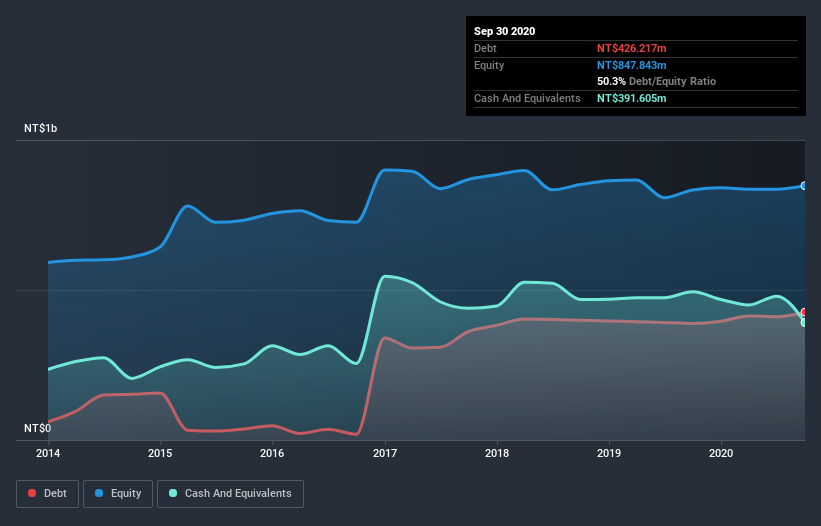
The external fund manager backed by Berkshire Hathaway's Charlie Munger, Li Lu, makes no bones about it when he says 'The biggest investment risk is not the volatility of prices, but whether you will suffer a permanent loss of capital.' So it seems the smart money knows that debt - which is usually involved in bankruptcies - is a very important factor, when you assess how risky a company is. We note that Zen Voce Corporation (GTSM:3581) does have debt on its balance sheet. But the more important question is: how much risk is that debt creating?
Why Does Debt Bring Risk?
Debt and other liabilities become risky for a business when it cannot easily fulfill those obligations, either with free cash flow or by raising capital at an attractive price. In the worst case scenario, a company can go bankrupt if it cannot pay its creditors. However, a more common (but still painful) scenario is that it has to raise new equity capital at a low price, thus permanently diluting shareholders. Of course, plenty of companies use debt to fund growth, without any negative consequences. The first step when considering a company's debt levels is to consider its cash and debt together.
See our latest analysis for Zen Voce
What Is Zen Voce's Net Debt?
You can click the graphic below for the historical numbers, but it shows that as of September 2020 Zen Voce had NT$426.2m of debt, an increase on NT$388.7m, over one year. However, because it has a cash reserve of NT$391.6m, its net debt is less, at about NT$34.6m.

How Strong Is Zen Voce's Balance Sheet?
The latest balance sheet data shows that Zen Voce had liabilities of NT$626.2m due within a year, and liabilities of NT$71.4m falling due after that. On the other hand, it had cash of NT$391.6m and NT$415.0m worth of receivables due within a year. So it actually has NT$109.0m more liquid assets than total liabilities.
This surplus suggests that Zen Voce has a conservative balance sheet, and could probably eliminate its debt without much difficulty.
In order to size up a company's debt relative to its earnings, we calculate its net debt divided by its earnings before interest, tax, depreciation, and amortization (EBITDA) and its earnings before interest and tax (EBIT) divided by its interest expense (its interest cover). This way, we consider both the absolute quantum of the debt, as well as the interest rates paid on it.
Zen Voce's net debt is only 0.30 times its EBITDA. And its EBIT easily covers its interest expense, being 65.3 times the size. So we're pretty relaxed about its super-conservative use of debt. And we also note warmly that Zen Voce grew its EBIT by 13% last year, making its debt load easier to handle. When analysing debt levels, the balance sheet is the obvious place to start. But it is Zen Voce's earnings that will influence how the balance sheet holds up in the future. So when considering debt, it's definitely worth looking at the earnings trend. Click here for an interactive snapshot.
Finally, a company can only pay off debt with cold hard cash, not accounting profits. So we always check how much of that EBIT is translated into free cash flow. Over the most recent three years, Zen Voce recorded free cash flow worth 76% of its EBIT, which is around normal, given free cash flow excludes interest and tax. This cold hard cash means it can reduce its debt when it wants to.
Our View
The good news is that Zen Voce's demonstrated ability to cover its interest expense with its EBIT delights us like a fluffy puppy does a toddler. And that's just the beginning of the good news since its conversion of EBIT to free cash flow is also very heartening. Considering this range of factors, it seems to us that Zen Voce is quite prudent with its debt, and the risks seem well managed. So we're not worried about the use of a little leverage on the balance sheet. There's no doubt that we learn most about debt from the balance sheet. However, not all investment risk resides within the balance sheet - far from it. Case in point: We've spotted 4 warning signs for Zen Voce you should be aware of, and 2 of them are significant.
If, after all that, you're more interested in a fast growing company with a rock-solid balance sheet, then check out our list of net cash growth stocks without delay.
If you’re looking to trade Zen Voce, open an account with the lowest-cost* platform trusted by professionals, Interactive Brokers. Their clients from over 200 countries and territories trade stocks, options, futures, forex, bonds and funds worldwide from a single integrated account. Promoted
Valuation is complex, but we're here to simplify it.
Discover if Zen Voce might be undervalued or overvalued with our detailed analysis, featuring fair value estimates, potential risks, dividends, insider trades, and its financial condition.
Access Free AnalysisThis article by Simply Wall St is general in nature. It does not constitute a recommendation to buy or sell any stock, and does not take account of your objectives, or your financial situation. We aim to bring you long-term focused analysis driven by fundamental data. Note that our analysis may not factor in the latest price-sensitive company announcements or qualitative material. Simply Wall St has no position in any stocks mentioned.
*Interactive Brokers Rated Lowest Cost Broker by StockBrokers.com Annual Online Review 2020
Have feedback on this article? Concerned about the content? Get in touch with us directly. Alternatively, email editorial-team@simplywallst.com.
About TPEX:3581
Zen Voce
Manufactures and sells semiconductor assembly and testing equipment in Taiwan and internationally.
Excellent balance sheet with proven track record.
Market Insights
Community Narratives





